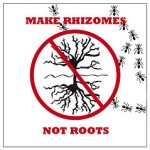I have quoted Charles Green before, as he shows how our systems ‘get set in concrete’. Once they are set, they don’t change. After a while, nobody remember anybody who remembers the old ways. So it’s just the way things are.
“Ideas lead technology. Technology leads organizations. Organizations lead institutions. Then ideology brings up the rear, lagging all the rest—that’s when things really get set in concrete.” —Charles Green
Our current triform way of organizing has been set in concrete for a few hundred years. Tribes are families (family values), institutions are set (loyalty to country & company), and markets are the dominant economic form (offshoring, outsourcing, and automation for profit). But we are entering a possible quadriform era where the network form will not only dominate but will change the older forms, once again: T+I+M+N.

“Americans [and many other citizens] are long accustomed to having a triform system — a liberal democracy where life revolves mainly around family and community (T), the government and public sector (+I), and the market economy and its private sector (+M). Those three domains have come to define how our leaders frame nearly all options for addressing policy problems: let government fix it, have the private sector do it, or toss it to family and community actors — or use a mixed partnership. For over two centuries, those three sectors and the options they offer worked well for propelling America’s growth as a great nation and world power. America became the paragon of a triform society, in a world where other liberal democracies have also emerged to develop their own triform systems, but most nations have had great difficulty getting beyond biform (T+I) systems, their clannish (T) societies subject to bureaucratic dictatorships and command economies (+I).” —David Ronfeldt
I share David Ronfeldt’s perspective that we need to make the network form work. Tweaking institutional or market forms will not give society the flexibility it needs to deal with the challenges of a connected, polluted, and shrinking world. But this conversation is not happening. Too often it sounds like positional leaders are talking about a world that no longer exists. Amazon may be a networked company but it is structured as a hierarchical institution in a traditional market. Jeff Bezos makes $52,000,000 a day while workers in his warehouses earn less than $52 per day. This is not a networked model. It is extreme market capitalism.
In a network society, leadership is helping make the whole network stronger, not accruing all the resources to a few nodes.

More: connecting leadership

